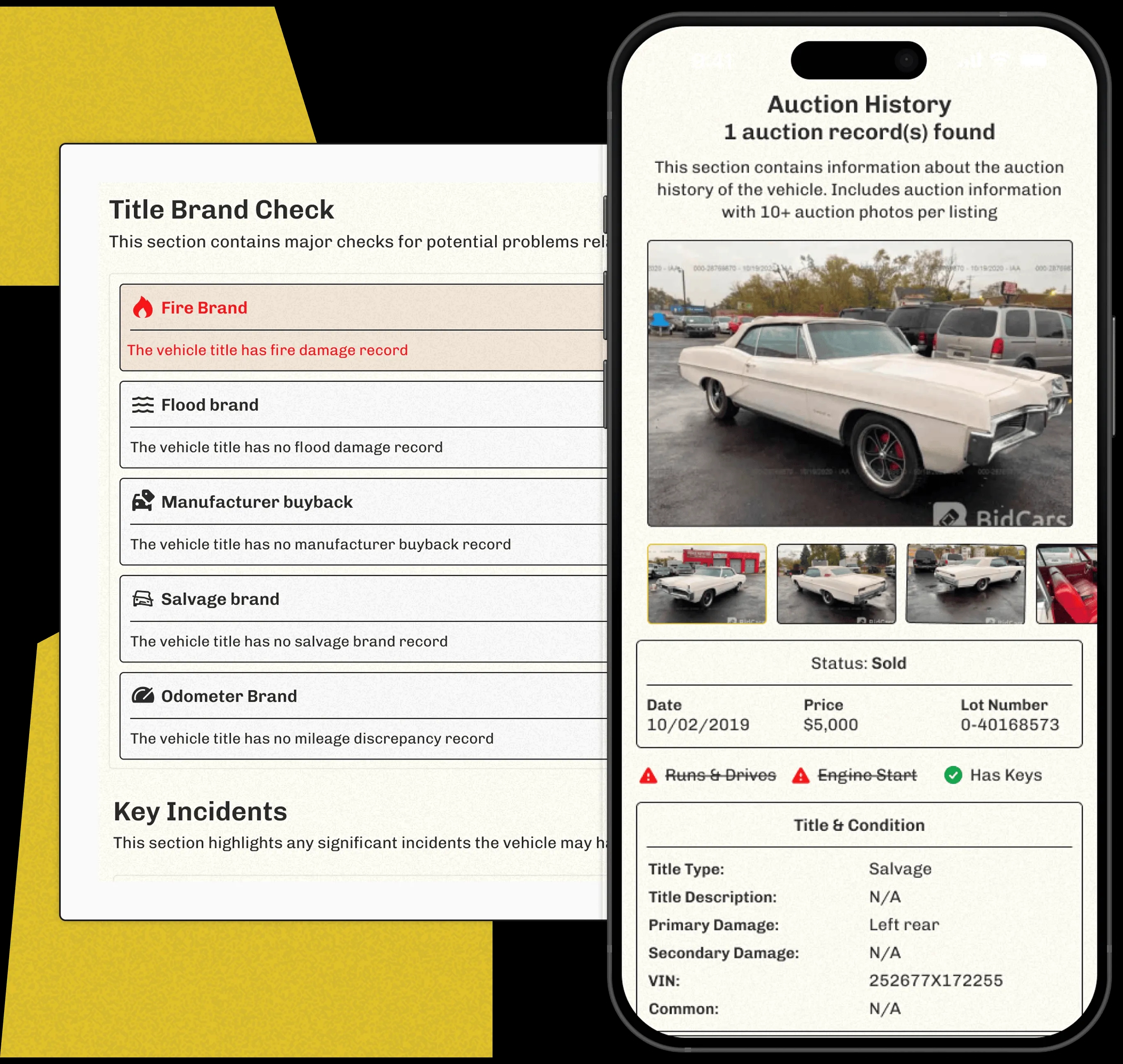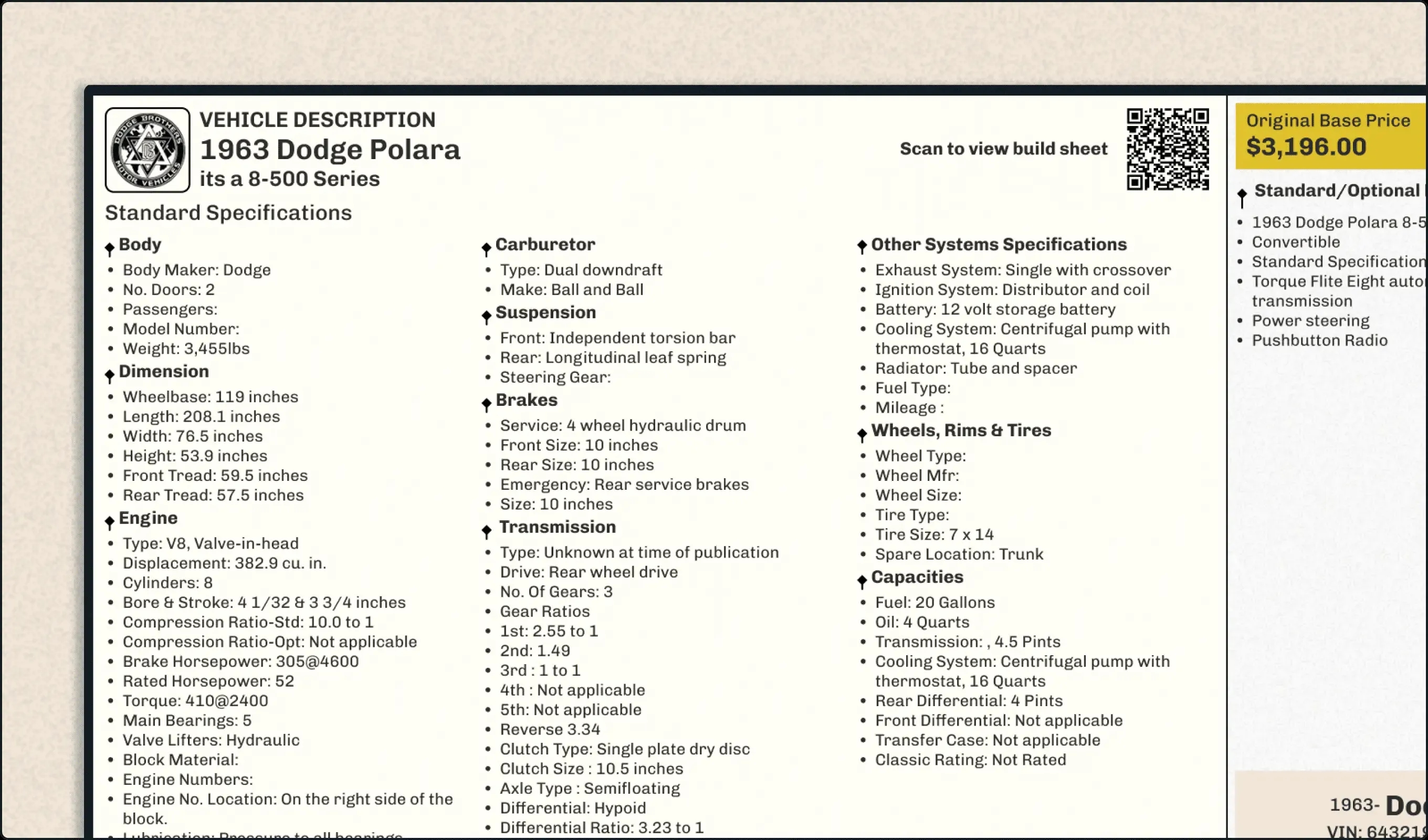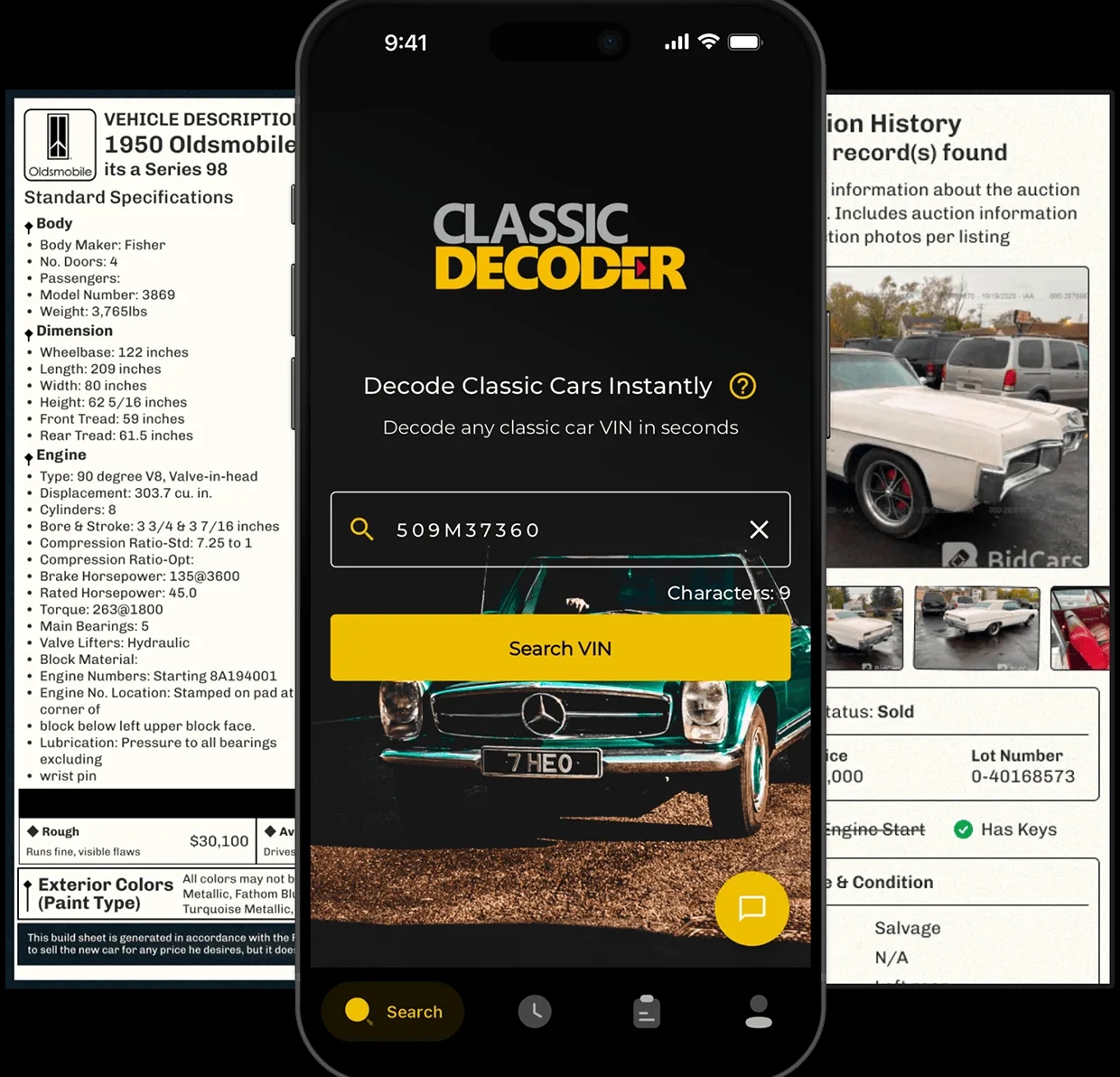1969 Plymouth VIP
The 1969 Plymouth VIP? Think sleek, understated muscle. A less flashy, more affordable cousin to the Road Runner, it offered big-block power in a surprisingly refined package. It wasn't a cultural icon like some muscle cars, but it reflects the era's love for performance with a touch of class. Its clean lines and subtle styling are its signature.
Decode Classic VINs to Get Vehicle History Report and Build Sheet
The Legacy and Allure of the 1969 Plymouth VIP
The 1969 Plymouth VIP has a legacy often tied to prestige and automotive excellence. This classic car resonates profoundly with collectors, not merely as a mode of transportation but as a significant piece of the automotive timeline. With its blend of elegance and performance, it demonstrates Chrysler's mastery in luxury car manufacturing during the late 1960s. Its allure isn't just skin-deep; the beauty of this vehicle lies in its details, from its design to its presence in pop culture and maybe some low-key celebrity associations, making it a cherished artifact among classic car enthusiasts.

1969 Plymouth VIP Models:
Select the vehicle's model to see the correct data for it.
How Much is Plymouth VIP Worth?
Original MSRP :$3,416.00
Outstanding
Clean
Average
Rough
1969 Plymouth VIP Specs
Interested in buying a classic car or selling one?
Access detailed history reports for classic vehicles from hundreds of manufacturers.
- Accident Records
- Theft Records
- Loan & Lien Information
- Auction Information
- Salvage Information and more

History of the 1969 Plymouth VIP
Starting its journey in 1966, the Plymouth VIP was Chrysler's strategic response to the growing appetite for luxury cars. With models like the Ford Thunderbird sparking public interest, the VIP aimed to elevate the Plymouth brand into the realm of personal luxury. Unfortunately, the Plymouth VIP was discontinued in 1969, struggling to establish its identity amid fierce market competition. Despite this, it remains a pivotal chapter in automotive history, illustrating the ambitious, forward-looking visions of its era.
Learn more about a classic car: Get Build Sheet by VIN.
Access reproduced classic build sheets to learn more about your classic vehicle details.
- Standard Specifications
- Original Base Price
- Standard & Optional Equipment
- Exterior & Interior Colors
- VIN ID & Location description

1969 Plymouth VIP Detailed Specifications
Performance-wise, the VIP wasn't just about good looks. Underneath its stylish exterior lay a powerhouse V8 engine with options ranging from the 318 cu in to the more robust 440 cu in, promising a thrilling ride typical of its era. This vehicle could hit a top speed of 117 mph and go from 0 to 60 mph in just about 9 seconds — not too shabby for the late '60s, right?
Pop Culture
Although it didn't shine as brightly in films and TV shows, its elegance and luxury features have made the 1969 Plymouth VIP a recognizable symbol of the late '60s opulence. However, if you're hoping to see it parked next to Tom Cruise or in an epic car chase scene, its onscreen appearances are rather sparse.
Famous Figures Who Owns 1969 Plymouth VIP
Here's the juicy bit—famous people and their fancy cars.
Elvis Presley
You can't talk luxury cars without mentioning the King of Rock 'n' Roll, can you? Though specific records of Elvis owning a Plymouth VIP are elusive, his penchant for luxury cars makes it likely. Elvis wasn't just about music; he had a taste for the finer things, and it's believed he showed some love for models like the VIP.
Steve McQueen
Steve McQueen, that Hollywood icon synonymous with cool cars, had a thing for high-performance vehicles. While the 1969 VIP isn't a direct credit to his extensive collection, it's the kind of car you'd imagine him slipping into effortlessly, like a well-tailored suit.
Jay Leno
The ever-enthusiastic gearhead, Jay Leno, renowned for his ginormous classic car collection, likely has something similar nestled among his favorites. Like a less flashier vehicle with historical significance and American craftsmanship.
Interested in Buying or Selling a Classic Car?
If you're looking to buy or sell such a prized vehicle, a classic car's history plays a crucial role. Here's why you should always consult vehicle documentation like build sheets or histories:
Accident Records: Provides insights on any previous damage, ensuring transparency.
Theft Records: Verifies the legitimacy of ownership to prevent any future legal hassles.
Loan & Lien Information: Ensures the car isn't entangled in financial obligations.
Auction Information: Offers knowledge on previous auctions, which can hint at market value.
Salvage Information: Helps you know whether it was ever deemed a total loss.
Fun Facts about the 1969 Plymouth VIP
Beyond the stats and records, it's the little tidbits that make cars come alive. Did you know? The VIP's design featured in promotional materials that included a retractable glass canopy concept, an idea aiming way into the future back then.
Classic VIN Decoder App |Now available on both Android and iOS!
At Classic Decoder, we believe that developing a mobile app is a great way to extend our classic car data solution hub to as many users as possible across the globe. Our app is built with users and precision in mind. It holds the key to unlocking the history and details of any retro car at your fingertips. It also comes with fascinating and user-friendly features that make it stand out from other mobile apps designed for this purpose.
The Classic Decoder app lets you decode and lookup any classic VIN in a flash. Access accurate vehicle information and history, make an informed decision faster, and buy and trade in classic cars with confidence.

Download The Classic Decoder App now.
Some unique features include:
- Support all classic VIN lengths from 5 to 13 digits
- Support classic cars produced from 1910 – 1980
- Online Garage features – to add and manage your vehicles
- 24/7 Customer Support
- Easy onboarding for first-time users
Explore Plymouth VIP from Other Years
Frequently Asked Questions
Well, the '69 Plymouth VIP, unlike its siblings, really carved out its own niche. Think of it like this: it wasn't the flashiest, wasn't the sportiest, but it offered a sweet spot – a comfortable, reasonably priced ride with enough pep to get you around town. It wasn't a muscle car, mind you, but it definitely wasn't a slug, either. Its unique selling point? A blend of practicality and a touch of style, setting it apart from its flashier counterparts, at least in my humble opinion. You know, it's the kind of car your grandpa might have loved; reliable, dependable, and kind of cool in a subtle way.
The 1969 Plymouth VIP wasn't exactly known for its powerhouse engines; it was more of a sensible choice. You could typically find it with a selection of V8s, though, generally on the smaller side, think around the 318 cubic inch range. There might have been some other choices, depending on the exact trim level – sometimes a six-cylinder was available. It's worth remembering, these weren't muscle car engines; you weren’t gonna win any drag races, but they were reliable workhorses, so to speak. They got the job done without any unnecessary fuss—perfect for everyday driving.
The 1969 Plymouth VIP primarily came in two body styles: a two-door hardtop and a four-door sedan. Now, I've seen some rare exceptions floating around, maybe a station wagon version somewhere; but those are quite uncommon, almost legendary. So, for all practical purposes, stick to the two-door and four-door models. The hardtop, especially, is a looker; classy lines, nice and clean.
That's a tough one! The value of a classic car depends on many factors (condition, originality, etc.), and it's always changing. Generally speaking, it's not as pricey as a high-performance muscle car from the same era – which is part of its charm, I'd say. It's more of a hidden gem, you know? A reliable classic you could actually afford, unlike those ridiculously expensive muscle cars. It's all about finding the right one – well-maintained and cared for, and doing some research to get a good price.
Like any classic car, you should expect some minor quirks and possible maintenance needs. Electrical gremlins are pretty common; things like wiring harnesses, that sort of thing. Rust, especially in older cars, is a big one – keep an eye out for that! Then there's the usual stuff: brakes, suspension. It's nothing a skilled mechanic can't handle, though. But remember, it's a classic; it'll need a little more TLC than a modern car, so be prepared.
Finding parts for these can sometimes be a little like a treasure hunt, but there are plenty of places to check out. Online forums dedicated to classic cars are a great starting point; you can get tips and leads from other enthusiasts. Specialty parts suppliers for classic Mopars (that's Chrysler, Dodge, Plymouth) are another good option, and then, of course, there are always the classic car junkyards. It might take some digging, but patience will be rewarded.

